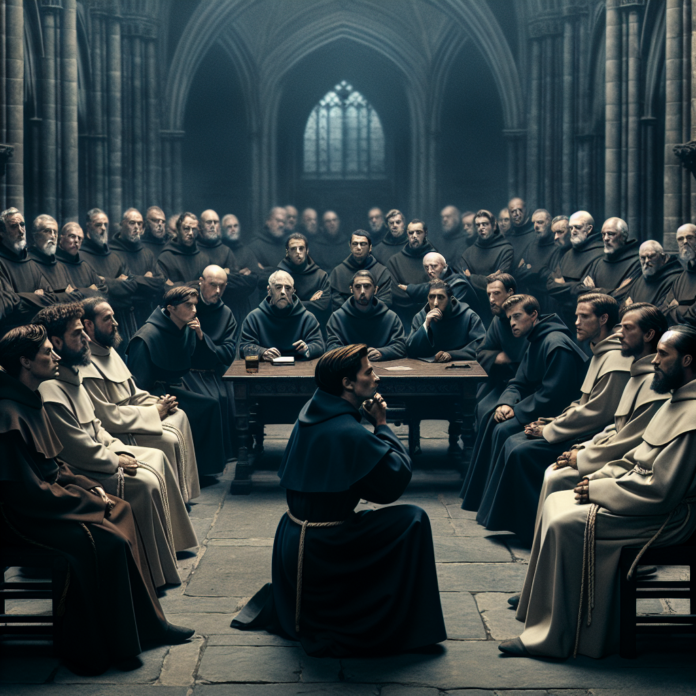The Strategic Tensions Between the Canons Regular of the Order of the Holy Cross (ORC) and the Institute of Christ the King Sovereign Priest (ICRSS): A Critical Analysis
In the realm of contemporary Catholicism, one salient issue has been the tension between the Canons Regular of the Order of the Holy Cross (ORC) and the Institute of Christ the King Sovereign Priest (ICRSS). These two groups, ostensibly united in their commitment to traditional liturgies and a conservative interpretation of Roman Catholic teachings, have found themselves at odds over the degree of integration they ought to maintain with the diocesan structures of the Church. This friction is emblematic of deeper conflicts within the traditionalist movement as a whole, highlighting the challenges posed by a rigid adherence to antiquarian practices.
## Historical Context
To understand the current tensions, it is imperative to delve into the historical background of these organizations. The ORC, founded in the 12th century, is steeped in an august history of monastic discipline and liturgical conservatism. Its members strive to maintain a balance between the traditionalist liturgies and a meaningful engagement with the diocesan structures. The ORC has shown an intrinsic flexibility that allows its members to be pastoral presences within the local parishes, welcoming a diversity of Catholics into its fold.
Contrastingly, the ICRSS, established in 1990, is a relatively modern entity that aims to exclusively celebrate the Tridentine liturgy, the traditional Latin Mass codified by Pope Pius V in the 16th century. Unlike the ORC, the ICRSS possesses an almost separatist inclination, eschewing diocesan integration in favor of ideological purity. This rigid stance exacerbates tensions not just with the ORC but also within larger archdioceses struggling to accommodate diverse liturgical preferences.
## Degrees of Integration
The distinctive approaches to diocesan integration lie at the crux of tensions between the ORC and ICRSS. The ORC’s moderate stance fosters greater unity within the Catholic community. Its willingness to cooperate with the diocesan hierarchies ensures that its members function within an established pastoral framework, at once preserving traditional liturgical values and recognizing the evolving needs of contemporary congregations. This synergy allows the ORC to operate within a wider ecclesiastical context, contributing to parish life in a manner that resonates with diverse demographics.
On the other hand, the ICRSS’s insistence on maintaining an insular traditionalism is often detrimental to broader ecclesial harmony. By segregating themselves and adhering strictly to pre-Vatican II practices, the ICRSS often finds itself at odds with diocesan bishops, pastoral councils, and lay communities. This isolationist inclination obstructs the fluidity of ministerial duties and the unified mission of the Church, creating a fissure within the Body of Christ. The ICRSS essentially prioritizes their archaic ideals over the collective well-being of the Church, a strategy that fosters division rather than unity.
## The Consequences of Rigidity
Moreover, the consequences of such rigidity transcendent liturgical preferences, impacting the pastoral efficacy and communal relevance of the Church. Historical incidents shed light on the pitfalls of extreme traditionalism. For instance, the schism of Archbishop Marcel Lefebvre in 1988 epitomized the disintegration prompted by an uncompromising allegiance to the old liturgy. Lefebvre’s Society of St. Pius X remains a somber reminder of the dangers of prioritizing liturgical purism over ecclesial unity.
The ICRSS seems to perpetuate this unfortunate legacy. Its recalcitrance is not merely a liturgical preference but an agenda that hinders diocesan cooperation. It is instructive to note that numerous parishes under diocesan supervision have expressed frustrations over the canonical irregularities and administrative autarky exercised by the ICRSS. The genuine pastoral needs of the faithful are frequently subjugated to the arcane liturgical fixation of the ICRSS leadership, reducing parish communities to battlegrounds for ideological purity tests rather than havens of spiritual nurturing.
## A Path Forward
Contrary to the caustic insularity propagated by the ICRSS, the ORC presents a viable model for harmonizing traditional liturgy with diocesan cooperation. The ORC’s historical model of integration serves as a blueprint for fostering liturgical richness without resorting to divisive exclusivity. By accommodating the legitimate diversity within the Church, the ORC exemplifies the Catholic ideal of ‘unity in diversity,’ ensuring that tradition serves as a foundation for spiritual growth rather than a fortress of exclusion.
Critics of traditionalism argue that it is a relic of a bygone era that engenders division rather than fostering unity. While traditionalists like the ICRSS may revile modernity and seek solace in bygone liturgies, they must recognize that the essence of tradition is not stagnation but living heritage. The prideful isolation practiced by the ICRSS does more to harm the Church’s mission than to preserve its sanctity. The traditionalist rhetoric often masks an anachronistic nostalgia that is more about resistance to change than upholding true Catholic values.
## Conclusion
In conclusion, the tension between the Canons Regular of the Order of the Holy Cross (ORC) and the Institute of Christ the King Sovereign Priest (ICRSS) underscores the complex challenges facing contemporary Catholicism. While the ORC represents a balanced approach of integrating with diocesan structures, the ICRSS’s obstinate traditionalism results in unnecessary division within the Church. To move forward, it is essential for traditionalist groups to adopt a more inclusive and cooperative stance, ensuring that ancient liturgical practices serve to enrich and unify the faithful rather than alienating and fracturing them.
The Catholic Church must navigate the delicate balance between upholding tradition and embracing the evolving needs of its congregations. In doing so, it can foster a more inclusive and harmonious community, where liturgical diversity is celebrated rather than resisted, and where the mission of the Church is paramount over mere liturgical preferences.
